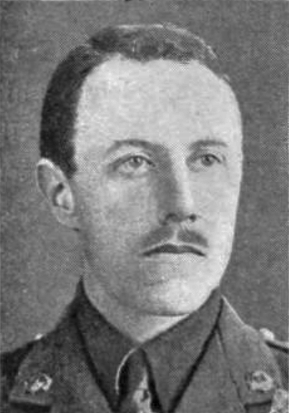Charles Calveley Foss facts for kids
Quick facts for kids
Charles Calveley Foss
|
|
|---|---|
 |
|
| Born | 9 March 1885 Kobe, Japan |
| Died | 9 April 1953 (aged 68) London |
| Buried |
West Hill Cemetery, Winchester
|
| Allegiance | |
| Service/ |
|
| Rank | Brigadier |
| Unit | Bedfordshire Regiment Home Guard |
| Battles/wars | First World War Second World War |
| Awards | Victoria Cross Order of the Bath Distinguished Service Order |
Meet Charles Calveley Foss! He was a brave English soldier. He was born on March 9, 1885, and passed away on April 9, 1953. He is famous for winning the Victoria Cross (VC). This is the highest award for bravery. It is given to soldiers in the British and Commonwealth forces. Charles Foss was a professional soldier in the British Army. He earned his VC in 1915. This was for his amazing actions during the Battle of Neuve Chapelle in the First World War.
Contents
Early Life and Army Start
Charles Foss was born in Kobe, Japan. His father, Reverend Hugh James Foss, was a Bishop. Charles's mother passed away when he was about nine years old. He went to school in England. He studied at Marlborough College.
In 1904, Charles joined the British Army. He trained at the Royal Military Academy Sandhurst. He became an officer in the Bedfordshire Regiment. By 1912, he was promoted to a captain.
Bravery in the First World War
When the First World War began, Captain Foss was in South Africa. His battalion, a group of soldiers, soon moved to the Western Front. This was the main fighting area in Europe. They arrived in October 1914. They fought in the First Battle of Ypres. This was a very tough battle.
After Ypres, Charles Foss was one of the highest-ranking officers still fighting. He was given the Distinguished Service Order (DSO). This award recognized his excellent service at Ypres.
The Battle of Neuve Chapelle
In March 1915, Foss's battalion took part in the Battle of Neuve Chapelle. On March 10, they moved forward. They supported another group of soldiers. They held their position for a day.
On March 12, German soldiers attacked. They captured a part of a British trench. This was a big problem. Captain Foss quickly took action. He gathered eight men. They carried handheld bombs. Under heavy enemy fire, they rushed forward. They attacked the Germans in the captured trench. They managed to take back the trench! They even captured 52 German soldiers.
Why He Won the Victoria Cross
Charles Foss's brave action was very important. It helped the British forces a lot. His courage was truly outstanding. The official report said:
"For most conspicuous bravery at Neuve Chapelle on 12th March 1915. After the enemy had captured a part of one of our trenches, and our counter-attack made with one officer and twenty men having failed (all but two of the party being killed or wounded in the attempt), Captain Foss, on his own initiative, dashed forward with eight men, under heavy fire, attacked the enemy with bombs, and captured the position, including the 52 Germans occupying it. The capture of this position from the enemy was of the greatest importance, and the utmost bravery was displayed in essaying the task with so very few men."
—London Gazette, 20 August 1915
Several men who fought with Foss also received awards. Private William Eade won the Distinguished Conduct Medal. Sergeant William Peggs also received an award. Private Walter Scrivener was mentioned for his bravery.
After the VC
Foss's battalion left the frontline on March 14. Later that year, he married Vere Katherine née Pollard. She was the widow of another army officer.
On October 28, 1915, King George V visited the soldiers. He personally gave the Victoria Cross to Charles Foss.
Foss continued to serve in the war. He became a staff officer. He was mentioned in official reports five times during the war. He was promoted to major. He worked with Canadian army divisions. He also taught at a staff school. He returned to the Western Front before the war ended.
Life After the War
After the war, Charles Foss was promoted again. He became a brevet lieutenant colonel. He worked as a chief of staff for a division. He also attended the Staff College for more training.
He spent five years at the War Office. Then, he commanded the King's Liverpool Regiment. In 1933, he became a colonel. He was sent to Burma to command soldiers there. He was also an aide-de-camp to King George V. This meant he helped the King.
In 1937, he was made a Companion of the Order of the Bath (CB). He retired that same year as a brigadier.
Second World War and Later Years
During the Second World War, Brigadier Foss joined the Home Guard. This was a defense force in Britain. He also led the Bedfordshire Army Cadet Force. In 1943, he became a deputy lieutenant of Bedfordshire.
Charles Foss passed away in London on April 9, 1953. He was 68 years old. He is buried in West Hill Cemetery in Winchester. He was survived by his second wife, whom he married in 1950. His first wife had died in 1947.
His Medals
Charles Foss's medals are on display. You can see them at the Bedfordshire and Hertfordshire Regimental Gallery. This is located at the Wardown Park Museum in Luton.
His medals include:
- The Victoria Cross (VC)
- The Order of the Bath (CB)
- The Distinguished Service Order (DSO)
- The 1914 Star with Mons clasp
- The British War Medal
- The Victory Medal
- The Defence Medal
- The War Medal 1939–1945
- The George VI Coronation Medal
- The Order of Danilo 4th Class (from Montenegro)
 | Lonnie Johnson |
 | Granville Woods |
 | Lewis Howard Latimer |
 | James West |

